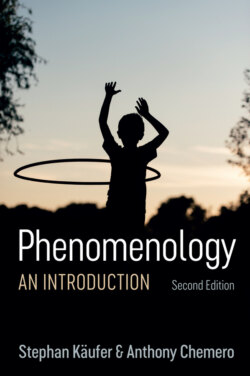Читать книгу Phenomenology - Anthony Chemero - Страница 12
1 Immanuel Kant: Eighteenth- and Nineteenth-Century Background
ОглавлениеHusserl thinks phenomenology is a new beginning in philosophy, a budding new science. At the same time he acknowledges the deep influence of the philosophical tradition. For most of his career he thinks of his work as “transcendental phenomenology,” thus locating it within Kant’s broad philosophical project. Heidegger similarly thinks he is making a new start, reawakening questions whose meaning, he claims, has been lost since antiquity. But he, too, knows that his work owes much to the tradition. Much of the first part of his most important book, Being and Time, has its origins in his earlier lectures on Aristotle. And in a lecture course in 1927 – the year Being and Time was published – he describes his deep involvement in Kant’s work: “When, a few years ago, I studied the Critique of Pure Reason again and read it against the background of Husserl’s phenomenology, it was as if the scales fell from my eyes, and Kant became for me an essential confirmation of the correctness of the path on which I was seeking” (Heidegger 1927/1928, p. 431). Merleau-Ponty’s Phenomenology of Perception is no less ambitious than the books of his two predecessors, although he is more modest in characterizing its revolutionary nature. He cites and refers to a vast literature of nineteenth- and twentieth-century philosophy and psychology and develops his ideas in an active dialog with his contemporaries. At several points he, too, singles out the importance of Kant’s transcendental framework.
It would be an endless exercise to attempt to explicate all the historical influences that shaped phenomenology. But we think it is important to spend a few pages reviewing central concepts from Kant’s critical philosophy, because many of Kant’s ideas have a very direct influence on Husserl, Heidegger, Sartre, and Merleau-Ponty. While, for the most part, these authors toil within Kant’s overall framework, they are not Kantians in a strict sense. Kant comes in for some trenchant criticism. Heidegger sharply rejects Kant’s focus on cognition through representations, and Merleau-Ponty similarly condemns Kant for ignoring the importance of the body and the indeterminateness of things in our experience. Gibson rails stridently against Kant’s distinction between concepts and intuitions. Still, some of Kant’s key arguments have clear successors in the work of the phenomenologists, and a quick overview of these arguments will prove helpful. For readers with some background in the history of eighteenth- and nineteenth-century philosophy, most of this will be familiar.
